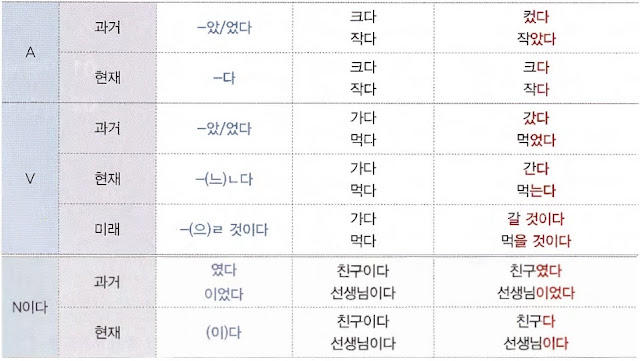(웨이밍의 일기)
10월 1일 날씨 : 맑음
오늘은 친구들과 함께 인사동에 갔다. 그곳에서 고향 에 가지고 갈 선물을 사고 전통차를 마셨다. 그리고 인사동의 명물인 호떡도 사서 먹었다. 인사동은 볼거 리가 많았지만 외국 사람이 많아서 복잡했다. 이번 주 말에는 남대문시장에 가 볼 것이다. 한국에 온 지 1년이 다 되었지만 아직도 남대문시장에 못 가 봤기 때문에 아 주기대가 된다.
(Wei Ming’s diary)
October 1, Weather: Sunny
Today, I went to Insadong with my friends. We bought gifts to take home and drank some traditional Korean tea. We also tried a special snack product of Insadong, hook. There were a lot of things to see in Insadong, but it was really confusing with all the foreigners there, This weekend, I plan to go to Namdaemun Market. Even though a year has passed since I came to Korea, I still haven’t gone to Namdaemun Market, so I’m really looking forward to going there.
This type of expression is used when writing diaries or reports to describe situations and events objectively.
 • 토요일이라서 길이 많이 복잡하다.
• 토요일이라서 길이 많이 복잡하다.
The traffic is bad because it’s Saturday.
• 내 동생은 조용한 노래보다 신나는 노래를 많이 듣는다.
My younger brother/sister listens to upbeat, cheerful songs more than soft, quiet ones.
• 나는 한국어를 공부하는 학생이다.
I am a student who studies Korean.
1. When 않다 follows a verb, it is conjugated as a verb, but when it follows an adjective, it is conjugated as an adjective.
• 나는 드라마를 좋아하지 않는다.
• 저 드라마는 슬프지 않다.
2. Because 싶다 and 좋다 are adjectives, they end in -다.
• 저 가수를 만나고 싶다.
• 나는 저 가수가 좋다.
3. In the narrative form, 나/우리 is used in place of 저/저희 to express “l/we”. Similarly, 나 is used for 저, 나는 is used for 저는,내가 is used for 제가, and 우리가 is used for 저희가.
• 전는 한국 회사에서 일을 한다.(X)
->나는 한국 회사에서 일을 한다. (O)
4. Sentences are almost never written in the form of questions in the narrative form. However, to express a question in this form, you can use the ending -(으)ㄴ가? that we learned at the beginning level.
• 현대인들은 왜 고독한 사람들이 많은가?
Why are there so many lonely people today?
• 우리는 왜 환경문제를 고민해야만 하는가?
Why should we worry about environmental problems?
•나는 왜 이 주제에 대해서 심각하게 생각하고 있는가?
Why am I thinking so seriously about this issue?
>> You can click on the title of the grammar below to learn ‘Informal Forms’:
반말체
>> Full of Intermediate grammar: Click here

